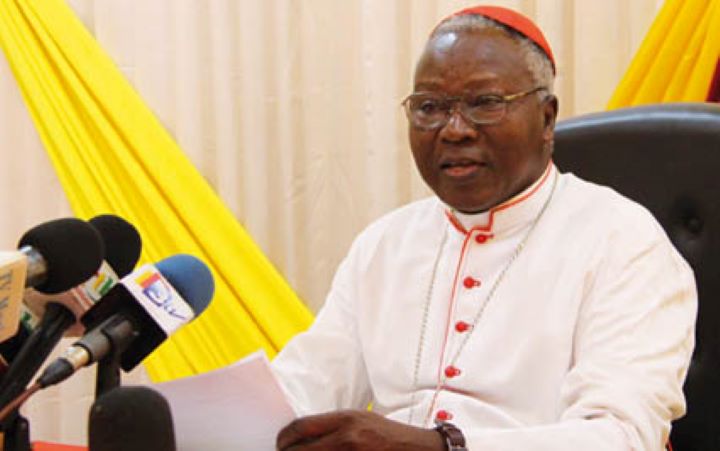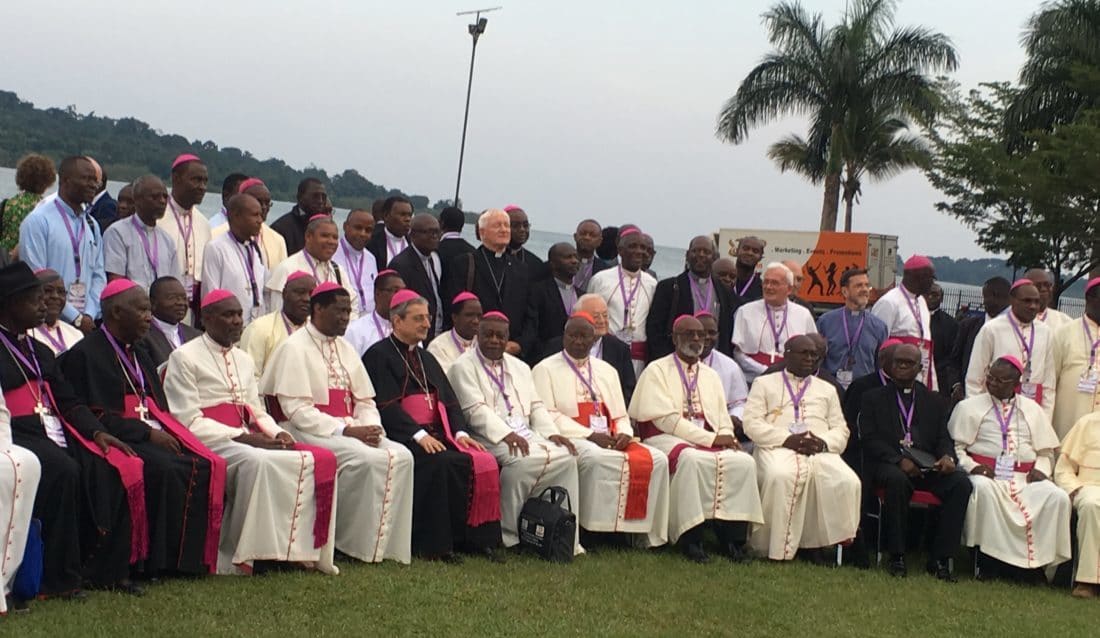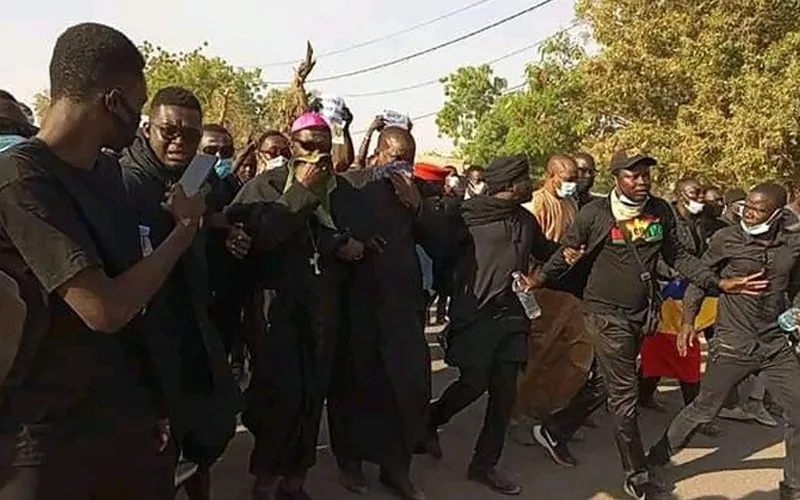“Esperamos continuar a colaborar com a Rádio Vaticano e desejamos-lhe uma celebração verdadeiramente feliz e gratificante”, disse o Presidente do Comitê Episcopal Pan-Africano para as Comunicações Sociais (CEPACS), Bispo Emmanuel Adetoyese Badejo, em sua carta de 11 de fevereiro dirigida aos líderes da Rádio Vaticano.
Numa página ao Prefeito do Dicastério das Comunicações do Vaticano, o Dr. Paolo Ruffini, Presidente do CEPACS, entidade do Simpósio das Conferências Episcopais da África e Madagascar (SECAM), acrescenta: “Alegro-me convosco e com toda a equipe e equipe que tem contribuído para o trabalho da rádio em todos esses anos. ”
Para a liderança do Comitê dos Bispos Católicos responsáveis pelas Comunicações Sociais na África, durante os 90 “anos fecundos” da programação da Rádio Vaticano, “a Igreja na África tem desfrutado em primeira mão os serviços desta joia da comunicação pastoral e da evangelização por mais de 70 anos. ”
“Durante aqueles anos, não apenas a voz e os atos do Santo Padre e da Igreja Universal foram transmitidos a milhões de africanos, é notável que a voz e a experiência da Igreja na África também tenham sido disseminadas para um público mundial, ”O Ordinário Local da Diocese de Oyo da Nigéria acrescenta na carta.
Ele observa que a Igreja na África “também não pode esquecer o serviço da Rádio Vaticano em transmitir à África a experiência da Igreja em outras terras”.
O bispo nigeriano, de 59 anos, continua a reconhecer a colaboração da Rádio Vaticano com a Igreja na África, que afirma “continua ainda hoje a dinamizar o trabalho de evangelização e estamos gratos por este dom”.
Fundada pelo Papa Pio XI em 12 de fevereiro de 1931, a Rádio Vaticano hoje transmite em 41 línguas, entre elas as línguas nativas africanas, como Kinyarwanda (Ruanda), Kirundi (Burundi), Ewondo (Camarões) e Kikongo (República Democrática do Congo).
Outras línguas incluem lingala (RDC, Congo Brazzaville), swahili (África oriental), malgaxe (Madagascar), somali (Chifre da África), tigrínia (Eritreia) e tshiluba (África Central).
Para marcar o 90º aniversário, a direção da Rádio Vaticano lançará uma web rádio 24 horas que deve estrear em 12 de fevereiro, com programas disponíveis na Internet em inglês, italiano, francês, espanhol, português, alemão e armênio.
As transmissões também estarão disponíveis no app da Rádio Vaticana. A Rádio Vaticano já transmite por ondas de rádio, ondas curtas, satélite, DAB + e digitalmente.
Em um comunicado à imprensa em 9 de fevereiro, o Dr. Ruffini disse que a web radio “permitirá que qualquer pessoa no mundo ouça a Rádio Vaticano em seu próprio idioma a partir de seu próprio smartphone ou computador”.
Funcionários da rádio, que esteve sob a gestão dos membros da Companhia de Jesus (Jesuítas) até 2017, também deverão lançar um site “reformulado” no mesmo dia, segundo o Vaticano News.
Por sua vez, o Diretor da Rádio Vaticano, Massimiliano Menichetti, disse que além dos comentários radiofônicos, o escritório criou novos programas, podcasts e audiolivros.
Ele acrescentou, referindo-se à grande reforma das comunicações do Vaticano pelo Papa Francisco em 2017, “A reforma que o Papa desejava nos projetou para uma nova dimensão na qual não somos mais apenas um rádio, mas uma realidade integrada ainda em progresso.”
“Nossa missão sempre foi não deixar ninguém sozinho e levar a esperança do anúncio cristão, a voz do Papa, e interpretar os acontecimentos à luz do Evangelho”, disse Menichetti.
Em sua mensagem para o Dia Mundial das Comunicações, divulgada em 23 de janeiro, o Papa Francisco falou sobre a Internet no contexto do jornalismo, chamando-a de “uma ferramenta poderosa, que exige que todos sejamos responsáveis como usuários e consumidores”.
“Potencialmente, todos podemos nos tornar testemunhas de eventos que, de outra forma, seriam esquecidos pela mídia tradicional, oferecer uma contribuição à sociedade e destacar mais histórias, inclusive positivas”, disse o Santo Padre, acrescentando que todos os cristãos enfrentam um desafio, a saber, “Comunicar encontrando pessoas, onde elas estão e como são.”
Alors que Radio Vatican célèbre les 90 ans de sa création le vendredi 12 février, les évêques catholiques d’Afrique ont, dans une lettre partagée avec ACI Afrique et mise à la disposition de RECOWACERAO NEWS AGENCY, RECONA, a exprimé l’espoir qu’il y aura une collaboration continue avec Rome radio catholique.
«Nous nous réjouissons de la poursuite de la collaboration avec Radio Vatican et vous souhaitons une célébration vraiment heureuse et enrichissante», a déclaré le président du Comité épiscopal panafricain pour les communications sociales (CEPACS), Mgr Emmanuel Adetoyese Badejo dans sa lettre du 11 février adressée aux dirigeants. de Radio Vatican.
Dans la page adressée au Préfet du Dicastère pour la Communication du Vatican, Dr. Paolo Ruffini, Président du CEPACS, une entité du Symposium des Conférences Épiscopales d’Afrique et de Madagascar (SECAM), ajoute: «Je me réjouis avec vous et avec tout le personnel et l’équipe qui ont contribué au travail de la radio pendant toutes ces années.
Aux dirigeants du Comité des évêques catholiques responsables des communications sociales en Afrique, au cours des 90 «années fructueuses» de la programmation de Radio Vatican, «l’Église en Afrique a bénéficié des services de première main de ce joyau de la communication pastorale et de l’évangélisation pendant plus de 70 ans. »
«Au cours de ces années, non seulement la voix et les actes du Saint-Père et de l’Église universelle ont été diffusés à des millions d’Africains, mais il est remarquable que la voix et l’expérience de l’Église en Afrique aient également été diffusées à un public mondial, », Ajoute l’ordinaire local du diocèse d’Oyo au Nigeria dans la lettre.
Il note que l’Église en Afrique «ne peut pas non plus oublier le service de Radio Vatican pour transmettre à l’Afrique l’expérience de l’Église dans d’autres pays».
L’évêque nigérian, âgé de 59 ans, poursuit en reconnaissant la collaboration de Radio Vatican avec l’Église en Afrique, qui, dit-il, «continue encore aujourd’hui à dynamiser le travail d’évangélisation et nous sommes reconnaissants pour ce don».
Créée par le pape Pie XI le 12 février 1931, Radio Vatican transmet aujourd’hui en 41 langues parmi lesquelles des langues africaines natives telles que le kinyarwanda (Rwanda), le kirundi (Burundi), l’ewondo (Cameroun) et le kikongo (République démocratique du Congo).
D’autres langues comprennent le lingala (RDC, Congo Brazzaville), le swahili (Afrique de l’Est), le malgache (Madagascar), le somali (corne de l’Afrique), le tigrinya (Érythrée) et le tshiluba (Afrique centrale).
Pour marquer le 90e anniversaire, la direction de Radio Vatican lancera une webradio de 24 heures qui devrait faire ses débuts le 12 février avec des émissions disponibles sur Internet en anglais, italien, français, espagnol, portugais, allemand et arménien.
Les émissions seront également disponibles via l’application Radio Vaticana. Radio Vatican émet déjà par ondes radio, ondes courtes, satellite, DAB + et numériquement.
Dans un communiqué de presse du 9 février, le Dr Ruffini a déclaré que la webradio «permettra à n’importe qui dans le monde d’écouter Radio Vatican dans sa propre langue depuis son propre smartphone ou ordinateur».
Les responsables de la radio, qui était sous la direction des membres de la Compagnie de Jésus (jésuites) jusqu’en 2017, devraient également lancer un site Web «remanié» le même jour, selon Vatican News.
De son côté, le directeur de Radio Vatican, Massimiliano Menichetti, a déclaré qu’en plus des commentaires radiophoniques, le bureau a créé de nouveaux programmes, podcasts et livres audio.
Il a ajouté, faisant référence à la réforme majeure des communications du Vatican du Pape François en 2017, «La réforme que le Pape a souhaitée nous a projetés vers une nouvelle dimension dans laquelle nous ne sommes plus uniquement une radio, mais une réalité intégrée qui progresse encore.
«Notre mission a toujours été de ne laisser personne seul et d’apporter l’espérance de l’annonce chrétienne, la voix du Pape, et d’interpréter les événements à la lumière de l’Évangile», a déclaré Menichetti.
Dans son message pour la Journée mondiale de la communication publié le 23 janvier, le pape François a parlé d’Internet dans le contexte du journalisme, l’appelant «un outil puissant, qui exige que nous soyons tous responsables en tant qu’utilisateurs et consommateurs».
“Potentiellement, nous pouvons tous devenir témoins d’événements qui autrement seraient négligés par les médias traditionnels, offrir une contribution à la société et mettre en valeur davantage d’histoires, y compris des histoires positives”, a déclaré le Saint-Père, ajoutant que tous les chrétiens sont confrontés à un défi, à savoir: «Communiquer en rencontrant les gens, où ils se trouvent et tels qu’ils sont.»
As Vatican Radio marks 90 years since its establishment on Friday, February 12, Catholic Bishops in Africa have, in a letter shared with ACI Africa and made available to RECOWACERAO NEWS AGENCY, RECONA, expressed the hope that there will be a continued collaboration with the Rome-based Catholic radio.
“We look forward to further collaboration with Radio Vatican and wish you a truly happy and fulfilling celebration,” the Chairman of the Pan African Episcopal Committee for Social Communications (CEPACS), Bishop Emmanuel Adetoyese Badejo says in his February 11 letter addressed to the leadership of Vatican Radio.
In the one-page to the Prefect of the Vatican’s Dicastery for Communications, Dr. Paolo Ruffini, the President of CEPACS, an entity of the Symposium of Episcopal Conferences of Africa and Madagascar (SECAM), adds, “I rejoice with you and with the entire staff and team who have contributed to the work of the radio in all these years.”
To the leadership of the Committee of Catholic Bishops responsible for Social Communications in Africa, during the 90 “fruitful years” of Vatican Radio’s programing, “the Church in Africa has enjoyed first-hand the services of this jewel of pastoral communication and evangelization for over 70 years.”
“During those years not only have the voice and acts of the Holy Father and the Universal Church been broadcast to millions of Africans, it is remarkable that the voice and experience of the church in Africa has also been disseminated to a world-wide audience,” the Local Ordinary of Nigeria’s Oyo Diocese adds in the letter.
He notes that the Church in Africa “cannot forget either the service of the Radio Vatican in beaming to Africa the experience of the church in other lands.”
The 59-year-old Nigerian Bishop goes on to acknowledge the collaboration of Vatican Radio with the Church in Africa, which he says “continues even today to energize the work of evangelization and we are grateful for this gift.”
Established by Pope Pius XI on 12 February 1931, Vatican Radio today transmits in 41 languages among them native African languages such as Kinyarwanda (Rwanda), Kirundi (Burundi), Ewondo (Cameroon), and Kikongo (Democratic Republic of Congo).
Other languages include Lingala (DRC, Congo Brazzaville), Swahili (Eastern Africa), Malagasy (Madagascar), Somali (Horn of Africa), Tigrinya (Eritrea), and Tshiluba (Central Africa).
To mark the 90th anniversary, the leadership of Vatican Radio will launch a 24-hour web radio that is expected to debut on February 12 with broadcasts available over the Internet in English, Italian, French, Spanish, Portuguese, German, and Armenian.
The broadcasts will also be available via the Radio Vaticana app. Vatican Radio already transmits via radio waves, shortwave, satellite, DAB+, and digitally.
In a February 9 press release, Dr. Ruffini said the web radio “will allow anyone in the world to listen to Vatican Radio in their own language from their own smartphone or computer.”
Officials of the radio, which was under the management of the members of the Society of Jesus (Jesuits) until 2017, are also expected to launch a “reworked” website on the same day, according to Vatican News.
On his part, the Director of Vatican Radio, Massimiliano Menichetti, said that in addition to radio commentaries, the office has created new programs, podcasts, and audiobooks.
He added referencing Pope Francis’ major reform of Vatican communications in 2017, “The reform the Pope desired projected us toward a new dimension in which we are no longer solely a radio, but an integrated reality still progressing.”
“Our mission has always been not to leave anyone alone and to bring the hope of the Christian proclamation, the voice of the Pope, and to interpret events in the light of the Gospel,” Menichetti said.
In his message for World Communications Day released January 23, Pope Francis spoke about the Internet in the context of journalism, calling it “a powerful tool, which demands that all of us be responsible as users and consumers.”
“Potentially we can all become witnesses to events that otherwise would be overlooked by the traditional media, offer a contribution to society, and highlight more stories, including positive ones,” the Holy Father said, adding that all Christians face a challenge, namely, “to communicate by encountering people, where they are and as they are.”
- RECOWA-CERAO WELCOMES TWO NEW BISHOPS - July 26, 2024
- TODAY WE ARE TAKING UP THE THIRD SEGMENT IN OUR SERIES - July 26, 2024
- CHARACTERISTICS OF GREAT LEADERS SHARED BY A USA AUTHOR - July 25, 2024







